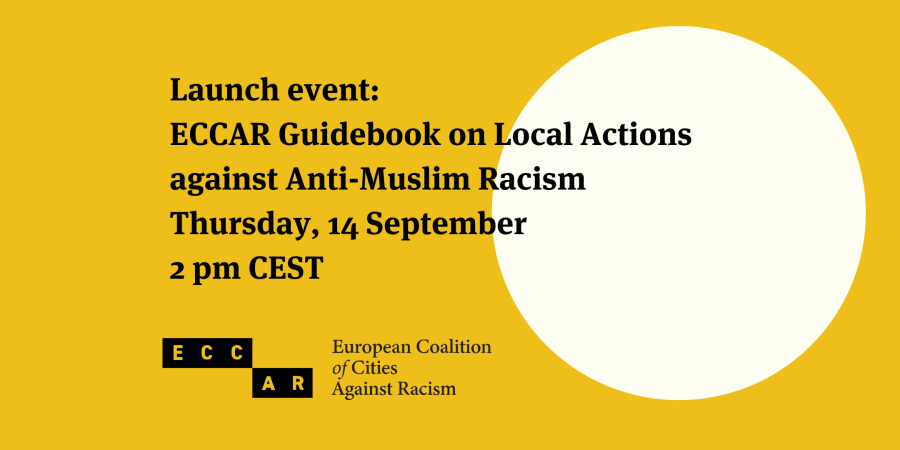
European Coalition of Cities against Racism (ECCAR) publishes Guidebook on Local Actions against Anti-Muslim Racism: Policy Recommendations for City Administrations and their Partners
Anti-Muslim racism affects Muslims and non-Muslims in European communities, causing intolerance, hatred, and discrimination. Policies and legislation target Muslims disproportionately, restricting their freedom of religion. Anti-Muslim racism also manifests itself in the stigmatisation of Muslims as a social and political problem, leading to discrimination in education, on the labour market, the housing market and in public discourse.
In Europe, Muslims and those perceived as Muslims face intersectional discrimination based on gender, sexual orientation, ethnicity, race, skin colour, religious identity, and social class. Experiences of anti-Muslim racism lead to fear, vulnerability, humiliation, and diminished self-esteem. Those affected face pressure to adjust their expression of identity to be acceptable to a prejudiced, anti-Muslim public, and often conceal or underplay their religious life to reduce suspicion and avoid discrimination and violence. Witnessing racist incidents can lead to socio-emotional problems in later life. This long-term domino effect harms not only the individual but also future generations.
“With this first-of-its-kind publication, the European Coalition of Cities against Racism (ECCAR) aims to strengthen local policies against anti-Muslim racism to build inclusive cities all across Europe that protect Muslim residents from discrimination and safeguard their right to equal opportunities in our cities. This is fundamental to protect our democracies in times of rising hatred and anti-democratic tendencies,” emphasises Danijel Cubelic, ECCAR Vice-President and Director of the Office of Equal Opportunities at the City of Heidelberg (Germany).
How the Guidebook Came to Be
To support its member cities in tackling anti-Muslim racism, ECCAR established a permanent working group in December 2020. The working group collected good practices in two steps: a mapping survey and personal consultations with the cities on their practices. A first list of good practices was published in 2021. “In Europe, Muslims and those perceived as Muslims face intersecting forms of discrimination that are always linked to their individual local context. Therefore, our first mapping included examples from various cities to ensure that the everyday reality of Muslim communities across Europe is represented,” explains Dr Linda Hyökki, Coordinator of the ECCAR Working Group on Anti-Muslim Racism. The guidebook is the result of the working group's efforts to increase the number of publications concerning good practices in tackling anti-Muslim racism locally. It is a significant lighthouse publication concerning local European policies, featuring good practices of 17 ECCAR member cities from nine countries. Additionally, contributions authored by stakeholders and experts working in the field, such as academics and NGO representatives, have been added to support the presentation of good practices in their respective thematic fields, which are: Intersectionality and Vulnerable Groups, The City as a Provider of Equal Services, Strengthening Civic Participation, Civic Education and Citizen Dialogue; Tackling Hate Crime and Discrimination, Intercultural Competence in Education.
Guidebook Launch Event on 14 September - 14:00-17:00 CEST
The guidebook will be launched at an online event on 14 September from 14:00-17:00 CEST. UNESCO Assistant Director-General Gabriela Ramos and ECCAR President Benedetto Zacchiroli will open the event. Their opening remarks will be followed by contributions from guest speakers, including Domenica Ghidei Biidu (European Commission against Racism and Intolerance, ECRI), Rabbi Moshe David HaCohen and Imam Salahuddin Barakat (AMANAH, Malmö), Dr James Carr (University of Limerick), Robin Sclafani (CEJI), Prof. Peter Hopkins (University of Newcastle), Leyla Jagiella (Muslim Academy Heidelberg) and ECCAR representatives. The presentations and panel discussions concentrate on the relevance of the guidebook for local work against anti-Muslim racism in terms of cooperation between city administrations and communities, as well as the question of how to maintain alliances between civil society and decision-makers in the face of a shrinking space for civic participation of Muslims all over Europe due to political pressure. Panels and other contributions will feature representatives from city administrations, researchers, and NGO representatives.
Programme and Registration
Please download the event programme below.
Please use the following link to register for the launch event: https://www.eventbrite.com/e/launch-eccar-guidebook-on-local-actions-against-anti-muslim-racism-tickets-680319974357
Q&A Session for the Press
A separate online Q&A session for the press will follow this online launch event, taking place from 17:15-17:45 CEST. To register, please write an e-mail to antimuslimracism@eccar.info.
Press Package
For more information (event programme, press release, information about the editors, ECCAR working definition of anti-Muslim racism), please download the ECCAR press package via the following link: https://nextcloud.heidelberg.de/index.php/s/MzdQRxwT3MAa6Pw
Contact for further information
Danijel Cubelic, ECCAR Vice President
Dr Linda Hyökki, Coordinator ECCAR Working Group on Anti-Muslim Racism antimuslimracism@eccar.info
